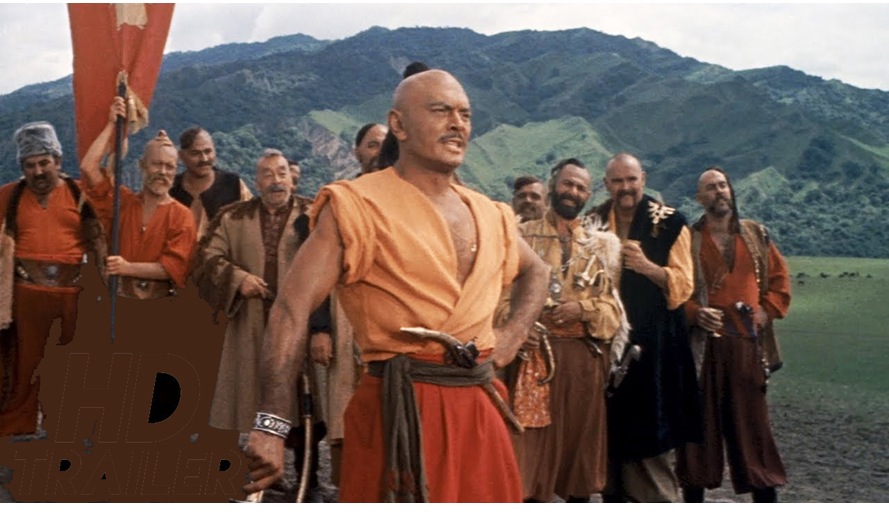AND TARAS BULBA

Yul Brynner as Taras Bulba (1962)
In this case the subject is a rising that occurred in the 1630s which I think is probably the inspiration behind Gogol's Taras Bulba. (21)
(21) A footnote in Kent: The complete tales of Nikolai Gogol, p.22 attributes it to the fifteenth century and says it has a number of anachronisms but it seems to me to fit the 1630s reasonably well.
In Shevchenko's poem the rising is prompted because the Orthodox are deprived by Catholic (Polish and Polonised Ukrainian) landlords of access to their churches which are often held by landlord's agents who are often Jews:
Unbaptised up to manhood grow
The children of our race,
For out of wedlock men must live;
Without a priest they die;
Our faith to Jewry has been sold
And locked our churches lie!
Like blackbirds covering a field,
The Poles and Uniates
Come swooping down.
Similarly, after Taras Bulba has stirred the Cossacks to action against the Tatars simply through love of warfare, despite a peace that has been agreed with them, they hear the fate of Ukrainians West of the Dnieper at the hands of Poles and Jews:
'"Such times have come that now even the holy churches are not ours."
"How do you mean, not ours?'
"Nowadays they are leased out to the Jews. If you don't pay a Jew beforehand, you cannot serve mass."
"What are you talking about?"
"And if a Jewish dog does not put a stamp with his unbaptised hand on the Holy Easter Cake, one cannot consecrate the cake."
"He is lying, comrades; it cannot be that an unbaptised Jew puts a stamp on the Holy Easter Cake."
"Listen! I've more to tell you: and the Catholic priests are driving now all over Ukraine in their two-wheeled cars. And the trouble is not that they ride in their carriages, but that the Orthodox Christians and not horses pull them. Listen! There's more to tell: they say the Jewesses are making themselves petticoats out of the priests' vestments. These are the things that are going on in the Ukraine, comrades!"' (pp.52-3)
The position of the Jews is ambiguous since there are Jewish tradesmen attached to the camp, largely selling alcohol. The story of what is happening in the West prompts a pogrom:
'"Hang all the Jews!" was heard from the crowd. "Don't let them make priests' vestments into petticoats for the Jewesses! Don't let them put stamps on the Holy Easter Cakes! Drown them all, the heathens, in the Dnieper!" These words uttered by someone in the crowd flashed like lightning through the heads of all and the crowd rushed to the outer village, intending to cut the throats of all the Jews.
'The poor sons of Israel, losing what little courage they had, hid in empty vodka barrels, in ovens, and even crept under the skirts of their wives; but the Cossacks found them everywhere. [...]
'They seized the Jews by their arms and began flinging them into the water. Pitiful cries rang out on all sides, but the hardhearted Cossacks only laughed at the sight of the Jews' legs in slippers and stockings kicking in the air.' (pp.53-4)
Later in the story, Taras Bulba has need of the services of one of the Jews who had been in the camp:
'This Jew was our friend Yankel. By now he had rented a bit of land and kept a little tavern; he had by degrees got all the gentry and nobility of the neighbourhood into his hands, had gradually extracted almost all their money, and the presence of this Jew was having a profound influence in the district. For three miles in every direction there was not a single hut left in decent condition; they were all tumbling down and falling into ruins; everything was being squandered in drink, and nothing was left but poverty and rags; the whole countryside was laid bare as though by fire and pestilence. And if Yankel had stayed there another ten years, he would certainly have laid bare the whole province.' (p.113)
Gogol describes the punishment of the Poles with much the same relish as Shevchenko:
'they laid out their comrades' bodies with respect and scattered fresh earth upon them that the crows and fierce eagles should not peck their eyes. But the bodies of the Poles they bound by dozens to the tails of wild horses and set them loose to race over the plain, and for a long way pursued them, lashing them all the time. The frantic horses galloped over ridges and hillocks, across the hollows and watercourses, and the dead bodies of the Poles were battered on the earth and covered with blood and dust.' (p.89)